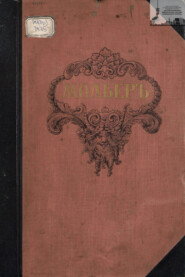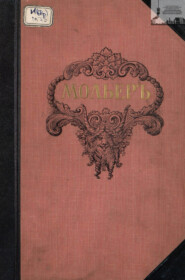По всем вопросам обращайтесь на: info@litportal.ru
(©) 2003-2024.
✖
The Bores
Год написания книги
2017
Настройки чтения
Размер шрифта
Высота строк
Поля
ER. Ah!
LIS. This close is pretty. (He sings the close over again four or five times successively). How do you like it?
ER. Very fine, indeed.
LIS. The steps which I have arranged are no less pleasing, and the figure in particular is wonderfully graceful. (He sings the words, talks, and dances at the same time; and makes Éraste perform the lady's steps). Stay, the gen-man crosses thus; then the lady crosses again: together: then they separate, and the lady comes there. Do you observe that little touch of a faint? This fleuret? These coupés running after the fair one.
[Footnote: A fleuret was an old step in dancing formed of two half coupées and two steps on the point of the toes.]
[Footnote: A coupé is a movement in dancing, when one leg is a little bent, and raised from the ground, and with the other a motion is made forward.]
Back to back: face to face, pressing up close to her. (After finishing). What do you think of it, Marquis?
ER. All those steps are fine.
LIS. For my part, I would not give a fig for your ballet-masters.
ER. Evidently.
LIS. And the steps then?
ER. Are wonderful in every particular.
LIS. Shall I teach you them, for friendship's sake?
ER. To tell the truth, just now I am somewhat disturbed …
LIS. Well, then, it shall be when you please. If I had those new words about me, we would read them together, and see which were the prettiest.
ER. Another time.
LIS. Farewell. My dearest Baptiste has not seen my Couranto; I am going to look for him. We always agree about the tunes; I shall ask him to score it.
(Exit, still singing.)
[Footnote: Jean Baptiste Lulli had been appointed, in the month of May of 1661, the same year that The Bores was first played, Surintendant et Compositeur de la musique de la chambre du Roi.]
SCENE VI. – ÉRASTE, alone
Heavens! must we be compelled daily to endure a hundred fools, because they are men of rank, and must we, in our politeness, demean ourselves so often to applaud, when they annoy us?
SCENE VII. – ÉRASTE, LA MONTAGNE
LA M. Sir, Orphise is alone, and is coming this way.
ER. Ah, I feel myself greatly disturbed! I still love the cruel fair one, and my reason bids me hate her.
LA M. Sir, your reason knows not what it would be at, nor yet what power a mistress has over a man's heart. Whatever just cause we may have to be angry with a fair lady, she can set many things to rights by a single word.
ER. Alas, I must confess it; the sight of her inspires me with respect instead of with anger.
SCENE VIII. – ORPHISE, ÉRASTE, LA MONTAGNE
ORPH. Your countenance seems to me anything but cheerful. Can it be my presence, Éraste, which annoys you? What is the matter? What is amiss? What makes you heave those sighs at my appearance?
ER. Alas! can you ask me, cruel one, what makes me so sad, and what will kill me? Is it not malicious to feign ignorance of what you have done to me? The gentleman whose conversation made you pass me just now…
ORPH. (Laughing). Does that disturb you?
ER. Do, cruel one, anew insult my misfortune. Certainly, it ill becomes you to jeer at my grief, and, by outraging my feelings, ungrateful woman, to take advantage of my weakness for you.
ORPH. I really must laugh, and declare that you are very silly to trouble yourself thus. The man of whom you speak, far from being able to please me, is a bore of whom I have succeeded in ridding myself; one of those troublesome and officious fools who will not suffer a lady to be anywhere alone, but come up at once, with soft speech, offering you a hand against which one rebels. I pretended to be going away, in order to hide my intention, and he gave me his hand as far as my coach. I soon got rid of him in that way, and returned by another gate to come to you.
ER. Orphise, can I believe what you say? And is your heart really true to me?
ORPH. You are most kind to speak thus, when I justify myself against your frivolous complaints. I am still wonderfully simple, and my foolish kindness…
ER. Ah! too severe beauty, do not be angry. Being under your sway, I will implicitly believe whatever you are kind enough to tell me. Deceive your hapless lover if you will; I shall respect you to the last gasp. Abuse my love, refuse me yours, show me another lover triumphant; yes, I will endure everything for your divine charms. I shall die, but even then I will not complain.
ORPH. As such sentiments rule your heart, I shall know, on my side …
SCENE IX. – ALCANDRE, ORPHISE, ÉRASTE, LA MONTAGNE
ALC. (To Orphise). Marquis, one word. Madame, I pray you to pardon me, if I am indiscreet in venturing, before you, to speak with him privately. (Exit Orphise).
SCENE X. – ALCANDRE, ÉRASTE, LA MONTAGNE
ALC. I have a difficulty, Marquis, in making my request; but a fellow has just insulted me, and I earnestly wish, not to be behind-hand with him, that you would at once go and carry him a challenge from me. You know that in a like case I should joyfully repay you in the same coin.
ER. (After a brief silence). I have no desire to boast, but I was a soldier before I was a courtier. I served fourteen years, and I think I may fairly refrain from such a step with propriety, not fearing that the refusal of my sword can be imputed to cowardice. A duel puts one in an awkward light, and our King is not the mere shadow of a monarch. He knows how to make the highest in the state obey him, and I think that he acts like a wise Prince. When he needs my service, I have courage enough to perform it; but I have none to displease him. His commands are a supreme law to me; seek some one else to disobey him. I speak to you, Viscount, with entire frankness; in every other matter I am at your service. Farewell.
[Footnote: During his long reign, Louis XIV. tried to put a stop to duelling; and, though he did not wholly succeed, he prevented the seconds from participating in the fight, – a custom very general before his rule, and to which Éraste alludes in saying that he does not "fear that the refusal of his (my) sword can be imputed to cowardice."]
SCENE XI. – ÉRASTE, LA MONTAGNE
ER. To the deuce with these bores, fifty times over! Where, now, has my beloved gone to?
LA M. I know not.
ER. Go and search everywhere till you find her. I shall await you in this walk.
BALLET TO ACT I
First Entry.
Players at Mall, crying out "Ware!" compel Éraste to draw back. After the players at Mall have finished, Éraste returns to wait for Orphise.
Second Entry.
LIS. This close is pretty. (He sings the close over again four or five times successively). How do you like it?
ER. Very fine, indeed.
LIS. The steps which I have arranged are no less pleasing, and the figure in particular is wonderfully graceful. (He sings the words, talks, and dances at the same time; and makes Éraste perform the lady's steps). Stay, the gen-man crosses thus; then the lady crosses again: together: then they separate, and the lady comes there. Do you observe that little touch of a faint? This fleuret? These coupés running after the fair one.
[Footnote: A fleuret was an old step in dancing formed of two half coupées and two steps on the point of the toes.]
[Footnote: A coupé is a movement in dancing, when one leg is a little bent, and raised from the ground, and with the other a motion is made forward.]
Back to back: face to face, pressing up close to her. (After finishing). What do you think of it, Marquis?
ER. All those steps are fine.
LIS. For my part, I would not give a fig for your ballet-masters.
ER. Evidently.
LIS. And the steps then?
ER. Are wonderful in every particular.
LIS. Shall I teach you them, for friendship's sake?
ER. To tell the truth, just now I am somewhat disturbed …
LIS. Well, then, it shall be when you please. If I had those new words about me, we would read them together, and see which were the prettiest.
ER. Another time.
LIS. Farewell. My dearest Baptiste has not seen my Couranto; I am going to look for him. We always agree about the tunes; I shall ask him to score it.
(Exit, still singing.)
[Footnote: Jean Baptiste Lulli had been appointed, in the month of May of 1661, the same year that The Bores was first played, Surintendant et Compositeur de la musique de la chambre du Roi.]
SCENE VI. – ÉRASTE, alone
Heavens! must we be compelled daily to endure a hundred fools, because they are men of rank, and must we, in our politeness, demean ourselves so often to applaud, when they annoy us?
SCENE VII. – ÉRASTE, LA MONTAGNE
LA M. Sir, Orphise is alone, and is coming this way.
ER. Ah, I feel myself greatly disturbed! I still love the cruel fair one, and my reason bids me hate her.
LA M. Sir, your reason knows not what it would be at, nor yet what power a mistress has over a man's heart. Whatever just cause we may have to be angry with a fair lady, she can set many things to rights by a single word.
ER. Alas, I must confess it; the sight of her inspires me with respect instead of with anger.
SCENE VIII. – ORPHISE, ÉRASTE, LA MONTAGNE
ORPH. Your countenance seems to me anything but cheerful. Can it be my presence, Éraste, which annoys you? What is the matter? What is amiss? What makes you heave those sighs at my appearance?
ER. Alas! can you ask me, cruel one, what makes me so sad, and what will kill me? Is it not malicious to feign ignorance of what you have done to me? The gentleman whose conversation made you pass me just now…
ORPH. (Laughing). Does that disturb you?
ER. Do, cruel one, anew insult my misfortune. Certainly, it ill becomes you to jeer at my grief, and, by outraging my feelings, ungrateful woman, to take advantage of my weakness for you.
ORPH. I really must laugh, and declare that you are very silly to trouble yourself thus. The man of whom you speak, far from being able to please me, is a bore of whom I have succeeded in ridding myself; one of those troublesome and officious fools who will not suffer a lady to be anywhere alone, but come up at once, with soft speech, offering you a hand against which one rebels. I pretended to be going away, in order to hide my intention, and he gave me his hand as far as my coach. I soon got rid of him in that way, and returned by another gate to come to you.
ER. Orphise, can I believe what you say? And is your heart really true to me?
ORPH. You are most kind to speak thus, when I justify myself against your frivolous complaints. I am still wonderfully simple, and my foolish kindness…
ER. Ah! too severe beauty, do not be angry. Being under your sway, I will implicitly believe whatever you are kind enough to tell me. Deceive your hapless lover if you will; I shall respect you to the last gasp. Abuse my love, refuse me yours, show me another lover triumphant; yes, I will endure everything for your divine charms. I shall die, but even then I will not complain.
ORPH. As such sentiments rule your heart, I shall know, on my side …
SCENE IX. – ALCANDRE, ORPHISE, ÉRASTE, LA MONTAGNE
ALC. (To Orphise). Marquis, one word. Madame, I pray you to pardon me, if I am indiscreet in venturing, before you, to speak with him privately. (Exit Orphise).
SCENE X. – ALCANDRE, ÉRASTE, LA MONTAGNE
ALC. I have a difficulty, Marquis, in making my request; but a fellow has just insulted me, and I earnestly wish, not to be behind-hand with him, that you would at once go and carry him a challenge from me. You know that in a like case I should joyfully repay you in the same coin.
ER. (After a brief silence). I have no desire to boast, but I was a soldier before I was a courtier. I served fourteen years, and I think I may fairly refrain from such a step with propriety, not fearing that the refusal of my sword can be imputed to cowardice. A duel puts one in an awkward light, and our King is not the mere shadow of a monarch. He knows how to make the highest in the state obey him, and I think that he acts like a wise Prince. When he needs my service, I have courage enough to perform it; but I have none to displease him. His commands are a supreme law to me; seek some one else to disobey him. I speak to you, Viscount, with entire frankness; in every other matter I am at your service. Farewell.
[Footnote: During his long reign, Louis XIV. tried to put a stop to duelling; and, though he did not wholly succeed, he prevented the seconds from participating in the fight, – a custom very general before his rule, and to which Éraste alludes in saying that he does not "fear that the refusal of his (my) sword can be imputed to cowardice."]
SCENE XI. – ÉRASTE, LA MONTAGNE
ER. To the deuce with these bores, fifty times over! Where, now, has my beloved gone to?
LA M. I know not.
ER. Go and search everywhere till you find her. I shall await you in this walk.
BALLET TO ACT I
First Entry.
Players at Mall, crying out "Ware!" compel Éraste to draw back. After the players at Mall have finished, Éraste returns to wait for Orphise.
Second Entry.

















